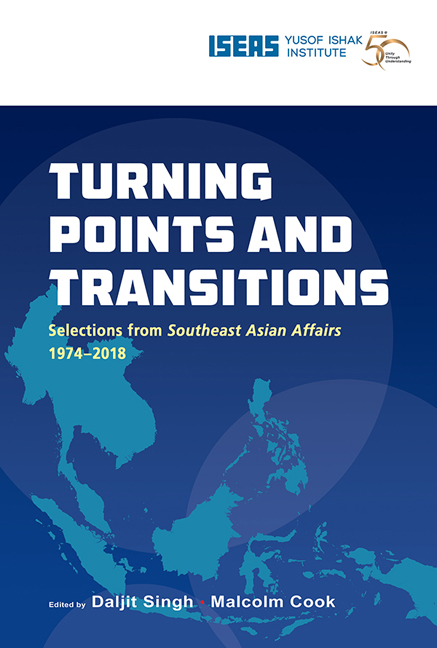Book contents
- Frontmatter
- Contents
- Message from the Director
- Foreword
- Foreword
- Introduction
- THE REGION
- BRUNEI
- CAMBODIA
- INDONESIA
- LAOS
- MALAYSIA
- The Security “Gap” in Peninsula Malaysia (1976)
- The ‘Battle Royal’ – The UMNO Elections of 1987 (1988)
- Malaysia: A Fateful September (1999)
- Tears and Fears: Tun Mahathir's Last Hurrah (2004)
- Malaysia: Political Transformation and Intrigue in an Election Year (2009)
- MYANMAR
- THE PHILIPPINES
- SINGAPORE
- THAILAND
- VIETNAM
The ‘Battle Royal’ – The UMNO Elections of 1987 (1988)
from MALAYSIA
Published online by Cambridge University Press: 29 May 2019
- Frontmatter
- Contents
- Message from the Director
- Foreword
- Foreword
- Introduction
- THE REGION
- BRUNEI
- CAMBODIA
- INDONESIA
- LAOS
- MALAYSIA
- The Security “Gap” in Peninsula Malaysia (1976)
- The ‘Battle Royal’ – The UMNO Elections of 1987 (1988)
- Malaysia: A Fateful September (1999)
- Tears and Fears: Tun Mahathir's Last Hurrah (2004)
- Malaysia: Political Transformation and Intrigue in an Election Year (2009)
- MYANMAR
- THE PHILIPPINES
- SINGAPORE
- THAILAND
- VIETNAM
Summary
UMNO (United Malays National Organisation) has occupied a unique position and has played a crucial role in the growth of the post-war Malaysian social system, particularly in the political sphere. Since its formation in 1946, it has been the single most influential institution to have shaped not only the political contours but also the overall social terrain in Malaysia. Since independence in 1957, it has remained the backbone of the Malaysian Government until today.
Central to any discussion of UMNO is its leadership. This is unavoidable because whatever happens within the leadership, particularly at the top among its national leaders — whether there is consensus or conflict amongst them — determines to a large extent UMNO's internal stability and hence to a great extent that of the country too. This was amply demonstrated, for example, when a leadership crisis which occurred in UMNO in the mid-1970s led to a series of other crises within the National Front coalition with the political situation in Malaysia becoming very tense during that period. At that time, UMNO was experiencing a “changing of guards” at the top initiated by the late Tun Abdul Razak in the early 1970s after he took over the premiership and the UMNO presidency from Tunku Abdul Rahman. It was under him that the now famous New Economic Policy (NEP), aimed mainly at “eradicating poverty” and “restructuring society” within Malaysia, was introduced. This policy clearly favours the Malays and other indigenous groups collectively known as bumiputera (literally, “son of the soil”), especially in the economic and educational spheres. As Razak saw it then, the successful implementation of this pro-Malay affirmative action strategy could only be carried out by the better-educated and technocratically oriented leaders. Therefore, the 1974 general election witnessed the rise of an élite group of Tun Razak's protégés, mostly hand-picked by him, some of whom became politicians and Cabinet ministers overnight. Amongst them were Dr Mahathir Mohamad and Musa Hitam, both expelled from UMNO by Tunku Abdul Rahman for “insubordination” after the 1969 general election, and Tengku Razaleigh, considered by many then as a “Malay economic genius”.
This move by Tun Razak was resisted by the pimpinan lama, or “old leadership”, within UMNO and subsequently a crisis erupted within UMNO's national leadership which affected the grass-roots leadership as well.
- Type
- Chapter
- Information
- Turning Points and TransitionsSelections from Southeast Asian Affairs 1974-2018, pp. 411 - 430Publisher: ISEAS–Yusof Ishak InstitutePrint publication year: 2018

